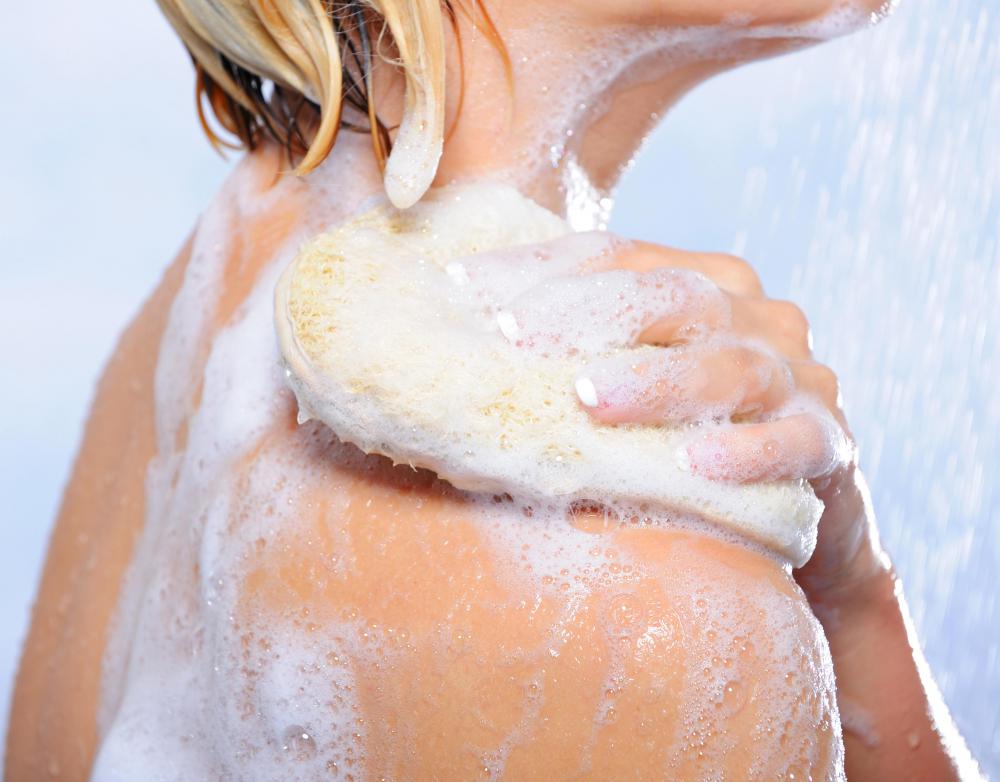At BeautyAnswered, we're committed to delivering accurate, trustworthy information. Our expert-authored content is rigorously fact-checked and sourced from credible authorities. Discover how we uphold the highest standards in providing you with reliable knowledge.
What Are the Effects of Hard Water on Skin?
Hard water, as opposed to soft water, is water with a higher-than-normal mineral content. Dry skin is one of the most common effects of hard water on skin. Since hard water makes it more difficult to rinse soaps and shampoos from the skin's surface, the skin may also become irritated. To prevent hard water from affecting skin, people can limit their exposure to hard water and use less soap on their bodies.
Hard water is a common problem for many households, especially those that use well water. This type of water contains many minerals, particularly calcium and magnesium. This occurs when ground water seeps through the soil and rocks.

Dry skin is one of the most common problems of prolonged exposure of hard water. When the water comes in contact with a person's skin, a small portion of the minerals are left behind. These deposits can leach the moisture and natural oils from the skin.
People with sensitive skin or skin conditions will also often have problems when they are exposed to hard water. Psoriasis and eczema sufferers, for instance, will often experience more dryness and irritation after being exposed to hard water. If hard water is the cause of frequent skin problems, avoiding the offending water is often necessary to help clear the skin up.

Hard water also makes it very difficult to rinse most soaps and detergents from the skin. A build up of these products on the skin may also be considered an effect of hard water on skin. This type of buildup can be very irritating, especially for people with sensitive skin. Soap residue can also clog the skin's pores, which can trap dirt and oil just below the surface of the skin. When this happens, acne and pimples can occur.
People can do a few things to limit the negative effects of hard water on skin. Most experts agree the best thing to do is avoid hard water. Installing a water softener can help remove many of the minerals in the water, making it softer.

If installing a water softener is not possible, however, people should limit their exposure to hard water. Taking shorter showers, for instance, can help prevent the uncomfortable effects of hard water on skin. Bottled or filtered water should also be used to wash the face, which is typically more sensitive than many other parts of the body.
Since hard water can prevent soaps and shampoos from lathering properly, many people tend to use more than is necessary. These excess products will usually only lead to more of a buildup on the skin. To prevent the soap from creating a residue and clogged pores, individuals with hard water should use only the normal recommended amount, or less, if possible.
AS FEATURED ON:
AS FEATURED ON:

















Discussion Comments
I moved to Florida and start seeing changes in my skin. I had to invest in a water filter which has made a big difference.
Hard water comes from wells? That's crap. It comes from city of Sunnyvale here in California and it is giving me dry skin and related skin conditions. I have to use ointments now because they can't figure out how to give normal quality water to their people. All they know is how to collect money.
I have hard water and my skin is always dry and flaky for this reason. I have seen some improvement after switching to an extra hydrating shower gel though. I also use baby oil right after I get out of the shower. It locks moisture in and prevents my skin from drying out.
I'm not going to get a water softener because I rent and my landlord isn't interested in buying one.
@literally45-- Have you thought about investing in a water softening shower head? My mom has one and it works well.
I used to live in a house that had hard water too. So I know what you mean. I used to rinse my hair with apple cider vinegar a few times a week to clean the build-up. I wonder if you could do the same for your skin? You just need to put a little bit of apple cider vinegar in plain water and rinse your skin and hair with it after shampooing. It might be worth a try.
We have hard water where I live and I hate it. It's terrible for hair and skin. My hair is dry and brittle and my skin is itchy and cracking. I have to use a ton of skin moisturizer after I get out of the shower, especially in winter. Otherwise, my skin is so dry that it itches and hurts.
Post your comments